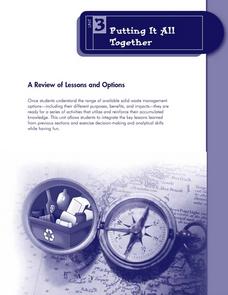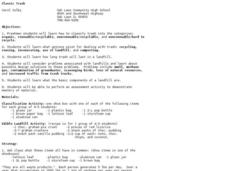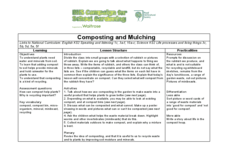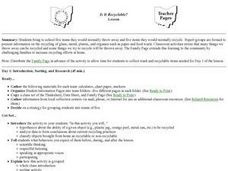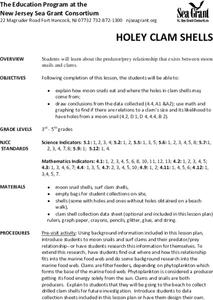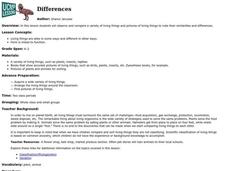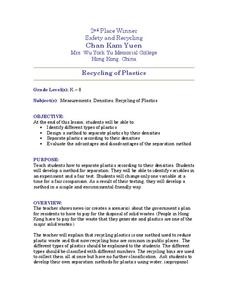Curated OER
Life Science- Useful Waste
Fourth graders explore the topic of waste and recycling. In this useful waste lesson, 4th graders classify objects and sort them into most usable and least usable categories. Students complete an activity sheet and have a discussion on...
Curated OER
School Yard Waste
Fourth graders examine the types of garbage that they collect on the playground. They collect the information in a spreadsheet and create a graph that displays the number of types of trash found. They design and monitor a playground...
Curated OER
Trash Talkin'
Students analyze classroom solid waste. In this environmental lesson plan, students weight and categorize classroom waste over a one week period. Students examine ideas on how to limit the amount of waste.
Curated OER
Let's Talk Trash
Students identify class and types of materials in our environment. In this investigative lesson students work in groups to process information about what actions should be taken concerning solid waste.
Curated OER
A Review of Lessons and Options
Students participate in a number of activities that reinforce the knowledge they have learned from previous units over waste management.
Curated OER
Household Hazardous Waste Identification
Fourth graders discuss the concept of reduce, reuse and recycle. They identify products in their homes that are hazardous and discover alternatives to them. They examine the inventory of other classmates hazardous materials.
Curated OER
The Impact of Water Pollution on Global Peace
Tenth graders participate in hands-on activities that require them to consider the implications of water pollution. In this environmental stewardship instructional activity, 10th graders conduct 6 experiments pertaining to water...
Curated OER
Discovering the Problem of Solid Waste
Students catagorize the types of garbage from going through a trash can provided by their teacher. They then chart the items on a graph and propose a solution to reduce the amount of garbage.
Curated OER
Classic Trash
Students investigate how trash is classified and the options to deal with it. In this trash and recycling lesson, students perform an activity to classify trash into organic, renewable/ recyclable, now renewable/recyclable and...
Curated OER
Composting and Mulching
Second graders define composting and recognize what can be composted. In this composting and mulching lesson, 2nd graders classify objects or pictures as good or bad for composting. Students write a story about life in the compost heap.
Curated OER
Is It Recyclable?
Students bring to school five items they would normally throw away and five items they would normally recycle. Expert groups are formed to present information on the recycling of glass, metal, plastic, and organics such as paper and...
Curated OER
Recycling Activities
Students explain the importance of recycling. For this environmental science lesson, students classify materials as recyclable or not. They make posters that promote the benefits of recycling.
Curated OER
Holey Clamshells
Students analyze data to make hypotheses and conclusions regarding the predator/prey relationship between moon snail and surf clams.
Curated OER
Differences
Students observe and compare a variety of living things and pictures of living things to note their similarities and differences.
Curated OER
CSI Clamshell Investigation
Pupils explore and explain how moon snails eat and where the holes in clamshells come from and then draw conclusion from the data collected. They incorporate math and graphing skills to determine if there is a relationship to a clam's...
Curated OER
Mini-Sanitary Landfill
Second graders work in groups to bury a variety of trash items and arrange them in a mini-landfill. They predict which items will biodegrade and then keep records of what the items look like every ten days. Students consider how...
Curated OER
Recycling of Plastics
Students separate plastics according to their densities, develop a method for separation and identify variables in an experiment and a fair test, changing only one variable at a time for a fair comparison. After testing, they develop a...
Curated OER
Oolitic Sand: An Introduction
Fourth graders investigate the characteristics of different types of sand. They compare and contrast the types of sand by making observations with a dissecting microscope. Then students draw what is seen and include shape, color, and...
Curated OER
Are You Thirsty: The Effects of Pollution on Drinking Water
Students discuss the different causes of water pollution. In this ecology instructional activity, students brainstorm ways to purify polluted water. They formulate their conclusion based on the results of the experiments.
Curated OER
CSI Clamshell Investigation
Students explore predator/prey relationships. They research information on moon snails and claims. Students draw conclusions from the data collected. They use math and graphing to determine if there is a relationship to the clam's size...
Curated OER
Water Pollution Graphing Activity
Students describe and identify the link between land use activities within a watershed and water quality. They evaluate the quality of a "water sample" ( a bag of skittles), graph their results, and form a hypothesis about the land use...
Curated OER
RIDE THE WILD LEAF
Students identify and interpret that leaves provide food for new trees and plants. Students cut out leaves and glue them on the appropriate
number on included worksheet. Students collect different types of leaves and make leaf rubbings....






